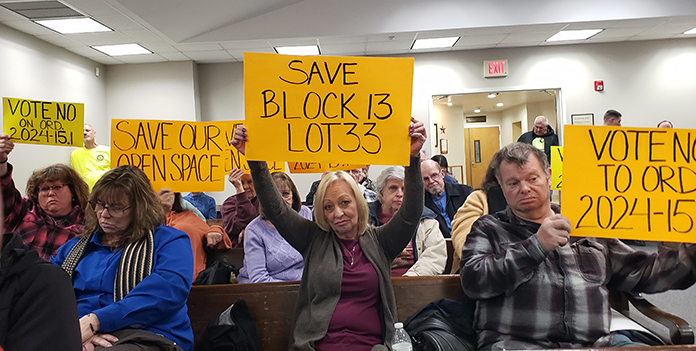
PLUMSTED – It was a three to two vote but the majority of Township Committeemen said “no” to a zoning change that has been discussed and debated for months.
An ordinance designed to expand C-4 zoning into the downtown business district on Main Street first emerged in August where it was loudly objected to. That was also the case at multiple workshop meetings that served as forums for public input and discussion.
The controversial ordinance finally reached its conclusion at December’s Committee meeting. Originally it was introduced to rezone four property lots in downtown New Egypt from R-40 (residential) to C-4 Zoning that would allow for residential and commercial.
Outgoing Mayor Dominick Cuozzo strongly supported the ordinance which he repeatedly said would serve to assist the school district’s plan to sell off their property on Main Street across from the elementary school for a one time only supplement to their budget that would help with the school district’s deficit.
This would put that property into a zone that would potentially draw a higher price for that property. It would also help the Plumsted Township Municipal Utilities Authority (PTMUA) possibly draw some commercial ratables that would result in added hookups to their system that would help offset their own deficit.
Residents including incoming township Committeemen-elect Tom Potter and James Hagelstein and Environmental Committee Chairman John Neyenhouse strongly objected to the idea, saying there were better options that could be explored. By changing the zoning, it could lead to detrimental action by developers changing the character of the downtown area, they said.
“Do a redevelopment plan and do this the right way,” Hagelstein said receiving applause from the audience. Several audience members came with signs calling for Ordinance 2024-15.1 to be voted down by the governing body.
Another resident asked about spot zoning, which is when a town changes what is allowed to be built in a specific area. This can sometimes lead to lawsuits when it’s done to block a proposed development.
Township Attorney Jean Cipriani replied, “the claim of spot zoning can always be made but not every rezoning of a single lot is spot zoning – particularly in a redevelopment context. There are certainly many circumstances in which a redevelopment area is created for one parcel of land because that is deemed an area worthy of redevelopment in that particular way.”
The property sale could net the school district around $1.2 million. They are facing a $2.5 million deficit in their next budget. A resident noted, “it is a really big decision for the town to undertake something that the town has no control over.”
School Superintendent David Ytreboe requested a zoning change that would affect 57 Main Street in a June letter to the Committee seeking to change the zoning on the land from R-40 to C-4.
Neyenhouse reminded the Committee that “there is a large portion of that lot that is wetlands that shouldn’t be built on. I really hate giving up one of our large undeveloped tracts of passive recreational open space for something that we potentially don’t know what it will be used for.”
“I believe the response from residents is clear, maintain our heritage of open space, work with our school district to find short- and long-term solutions for their financial needs and find a better solution that represents our values,” Committeeman Robert Bowen said voting against the ordinance and receiving citizen applause.
Committeeman Michael Hammerstone voted no as well saying, “after the last couple of meetings I’ve had the chance to talk to many people about different ideas of the Land Use Board. Residents and I feel that the school (district) really stuck it to us and I feel like we are being pushed into doing this. I think there has to be better ways than just changing this zoning. It is not a good idea.”
Committeeman Leonard Grilletto said, “I understand you want to preserve land but you can’t always preserve land. You need businesses here. The School Board has a right to sell its property. It is not going to solve their problem. I’ll vote for it. People may be disturbed but that is my vote.”
Mayor Cuozzo spoke next. “This is the process and this is how it works. We bring things up for a vote. You discuss them publicly. I know a lot of folks have weird ideas about how these things work but when you don’t do them publicly like this then discussions are done behind closed doors and that is not what we want.”
“I am glad we are voting on it tonight and everyone is entitled to their vote. I take deep offense to anyone who says that there is a bad motive here,” the mayor added to which a member of the audience cried out, “there are better options.” He voted for the ordinance.
Deputy Mayor Herb Marinari broke the tie noting his 18 years of service on the school board, 15 of which were in the role of Board President and his support for the students and staff of the school system. “I would never do anything negative against the school board but I vote no.”
The room exploded with cheers and applause and a thank you to Marinari.
Cuozzo said, “I think this would have been a good thing for the school and for the town. I am sorry it didn’t pass.”






